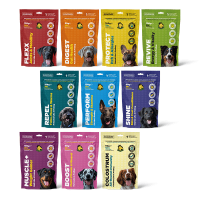Supplements
Certain supplemental ingredients, including probiotics, superfoods and herbs, will also boost immune health. Here are a few to consider:
Probiotics: Maintaining a healthy gut is essential for a robust immune system. Dog probiotics play a key role in promoting a balance of beneficial bacteria in the gut, which in turn supports overall immunity. Extensive research underscores the importance of gut health in overall wellness. A comprehensive 2023 review highlights the beneficial effects of probiotics on the health of dogs and cats, including significant improvements in canine immune responses [3].
Learn more about the vital role of gut health in our article, Secrets of Dog Gut Health.
Vitamin C and E: These antioxidants help protect cells from damage and support immune function. While dogs can synthesise vitamin C on their own, supplementation can be beneficial, especially during times of stress or illness.
Herbal remedies like echinacea, ginger, and chamomile can be incorporated into your dog’s diet to further support the immune system and reduce inflammation. Echinacea herb is known for its immune-boosting properties. It can help reduce the severity and duration of respiratory infections.
Garlic has antiviral, antibacterial, and anti-inflammatory properties. It can be given in small, appropriate amounts based on the dog’s weight
Colostrum is rich in antibodies, a colostrum supplement can help strengthen the immune system, particularly in puppies and older dogs.
NAC – N acetyl cysteine: A precursor to glutathione, a powerful antioxidant that supports overall health. It plays a crucial role in improving bronchial and lung function by helping to thin and loosen mucus, which aids in mucus clearance and reduces cough symptoms.
Medicinal mushrooms: such as Shiitake, Reishi, and Turkey Tail are excellent for enhancing the immune system. They contain beta-glucans, compounds known for their ability to support the body’s defence mechanisms against illnesses. These mushrooms are rich in these beneficial compounds, which help stimulate immune response and protect against various health threats.
Turmeric is known for its anti-inflammatory and antioxidant properties, which can be highly beneficial for dogs’ immune function. The active compound in turmeric, curcumin, helps reduce inflammation and supports the immune system by fighting off harmful free radicals. This natural spice can enhance immune response, aid in managing chronic inflammatory conditions, and support overall health in dogs.









0 comments